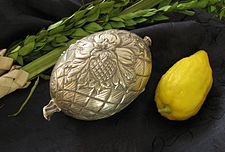
The history of our nation is linked with Pesach. Many of our mitzvoth—mezuzah, tefillin, Shabbat, honest weights, the prohibition of charging interest—are directly related to our Egyptian experience. There is an obligation to recall the Exodus on a daily basis and to relive that event once a year at the Seder. Sukkot seems like a minor festival in comparison.
While we spend weeks if not more preparing for Pesach, Sukkot gets short shrift. With the focus on the introspective days of Rosh Hashanah and Yom Kippur, our preparation tends to begin a few days beforehand. While the Shulchan Aruch notes that 30 days before Pesach we inquire and expound about the festival, the building of the Sukkah is actually the last law recorded of the laws of Yom Kippur. Only after Yom Kippur is over do we begin building our Sukkah. The supremacy of Pesach is further demonstrated by its much wider observance amongst the general community and the (often excessive) meticulousness with which the observant community prepares for the festival.
The story of the Exodus is described in great detail in the Torah; contrast that to Sukkoth, where the Talmudic rabbis debate why we are actually obligated to sit in the Sukkah. Such a debate arises only because the Torah never actually makes mention of us actually dwelling in Sukkot in the desert. The only reference to Sukkot is the command of the Torah to dwell in the sukkah, with the purpose of its commemoration not clearly spelled out.
Yet in many ways, it is Sukkot that is the more significant holiday.
The holiday of Pesach is rooted in the past: “So that you will remember the day you left Egypt, all the days of your life” (Devarim 15:3). Sukkot, on the other hand, looks to the future: “So that your future generations will know that through Sukkot, I redeemed the Jewish people when I took them out of Egypt; I am the Lord your G-d” (Vayikra 23:43). While we come from a glorious past, the more important quest is to help shape an even more glorious future.
Looking forward should be the natural result of the Yamim Noraim, where our focus has been on the past, the wrongs we have committed over the course of time. Teshuva begins with acknowledging the wrongs we have done in the past, but can only be completed with the resolve to do and be better in the future. As we cannot change the past, we can only pray that our teshuva is accepted; but what will be in the future is, to a large extent, in our own hands.
It is really Egypt that was the birthplace of our nation, and the Torah reminds us over and over again that our sojourn there is meant to teach us to be sensitive to the stranger. We may have originated in Egypt, but our destination is Israel. But it is Sukkot that focuses on the land of Israel, where (thankfully) both the present and the future history of the Jewish people will be made. The Sukkah itself marks our long journey—both past and present—towards the land, and the lulav, etrog, hadas and arava celebrate the bounty of that land.
With Pesach rooted in our past, the Torah commands us to “remember” Pesach; but regarding Sukkot, our future generations must “know” the holiday. It is knowledge that gives us the power and ability to mold our future. While memory is crucial, without knowledge, memory can lead to inertia and frustration with this present that may not match our sometimes-faulty memories.
Our Talmudic sages “codified” many of the laws of chinuch, of education, in masechet (tractate) Sukkah. They were well aware that it is the education we give our children that will determine the success of our future. May we merit educating them well.
Chag Sameach!



